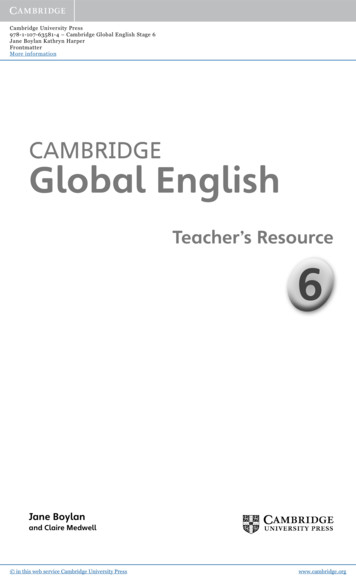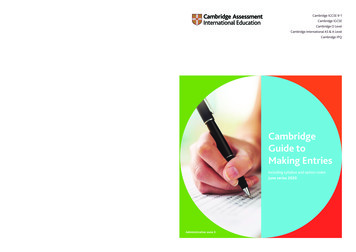Greening Your Garden - Cambridge City Council
36Greening Your Home – Help the Environment, Save Energy, Water and MoneyMake Room for Wildlife6GreeningOur gardens make up a valuable livinglandscape for wildlife. With pressures on theirnatural habitats, some of our best-loved wildlifespecies like sparrows and hedgehogs areincreasingly reliant on our gardens for food,shelter and water. Why not consider thefollowing ways to improve your garden forwildlife?nYourGardenConsider adding a pond – it will attract frogs,toads, dragonflies and many bird species todrink and bathe. Even a sunken dustbin lidcan be an oasis for wildlife.For more information on making yourgarden a haven for wildlife, ife-gardeningIf you are lucky enough to have a garden, nomatter its size, you can make a positivecontribution to our city’s environment andbiodiversity. Gardens allow us to interactwith the natural environment, and gardeninghas been proven to help reduce stress andaid recovery from mental illness. However,sometimes our efforts at maintaining andimproving our gardens are misguided. Forexample we can end up using too manyharmful chemicals and wasting too muchwater.Image: Jenny SteelIntroductionThere are a number of ways that you canimprove your garden space and promotewildlife, whilst saving water at the same time.Your garden can also provide you with theopportunity for composting household waste,which can then be used to improve the soilin your garden.nUse plants that provide nectar for insects. TheRoyal Horticultural Society has a useful list ofplants for pollinators that provide flowers allyear round.Image: Helen BrooksFor more information, visit www.rhs.org.uk
Greening Your GardenPlant a hedge –it can provideinterest as wellas a shelter forwildlife.Collectrainwater in awater butt anduse it to wateryour garden.37Add a compostbin. Compostcan be used toimprove yoursoil.Try growingfruits andvegetables.Use a wateringcan instead ofa sprinkler.Avoid usingpesticides.Control pestsby encouragingtheir naturalenemies.From Juneonwards, letyour grassgrow a bitlonger.It will staygreener forlonger withoutthe need forwatering.Consideradding a pondto your garden.Plant a tree(if you do notalready haveone) – it willfilter pollutionand provideshelter forbirds.Attract birds toyour gardenwith bird foodand water on abird table, ornesting boxesin safe spaces.Ask your gardencentre about thespecies ofplants thatrequire lesswater. It willsave you timeas well as water.Use permeablehard surfaces.
38Greening Your Home – Help the Environment, Save Energy, Water and MoneyConsider carefully what shrub or tree you plant.Some species could affect the structure of youror your neighbour’s house with subsidence.Contact the Council’s Arboriculture (Tree) Teamfor advice on Tel: 01223 457200 or emailtrees@cambridge.gov.uk.Image: Jenny SteelOrganic GardeningnnCreate some quiet wild patches to encouragewildlife, such as log-piles for insects. Leavesome of your tidying up until the spring. Birdscan eat seeds over winter and ladybirds like toshelter in dead flower stalks.Attract birds by putting out bird food and asaucer full of water, and put up nesting boxesin safe spots.For more information on the best nest boxdesigns and locations to encourage differentspecies, visit www.rspb.org.uknThe best way to control pests in the garden isto encourage their natural enemies. Birds,amphibians and hedgehogs eat slugs andsnails, and ladybirds and hoverflies eatgreenfly and their eggs.nAvoid using slug pellets. They can killhedgehogs and garden birds which eat theslugs, and even household pets.nPlanting disease-resistant varieties of rosesand other plants will mean you do not have touse so many pesticides to keep them healthy.nIf you grow vegetables, companion plantingcan help reduce pest attacks. For example,marigolds and poached-egg plants attractladybirds and hoverflies, which eat greenflyand other pests.nMulching your garden plants with grassclippings keeps down weeds, improves yoursoil and saves water by reducing evaporation.nUse peat-free compost. Peat is a finiteresource and many wildlife habitats are nowthreatened by peat extraction. Alternatives topeat include garden compost and leaf mould.Mushroom compost is widely available andoften costs less than peat.nReplace fencing with a hedge – a mixedhedge can provide colour and interest, plusfood and shelter for wildlife.nConsider planting a tree. Trees filter airpollution, shelter birds and keep streetsshaded and cool. The Council offers free treesto mark the birth of a baby.For more information visitwww.cambridge.gov.uk/trees-for-babiesImage: Jenny SteelImage: Jenny SteelFor more information on organic gardening, visitwww.lowimpact.org and look at the factsheets inthe ‘Land’ section.
Greening Your Garden39nInstall a water butt to collect water from yourhouse, garage or shed roof to water yourgarden.nGreywater from bathing or washing up canalso be used for all but the most sensitive ofgarden plants. Do not use on soft fruit orvegetables you intend to eat.nTry not to use sprinklers. If you must wateryour garden, remember infrequent watering isbetter than regular sprinkling as it encouragesthe roots to search for water.nFrom June onwards mow grass lessfrequently. It will stay greener for longerwithout needing to be watered.nChoose plants for their drought tolerance, fortheir compatibility with your soil and theirintended position. Ask your local gardencentre or nursery for advice.Image: WRAPWater Use in Your Gardenmixing into planters, and can really make yourgarden bloom. When used as mulch it can helpsuppress weeds and retain moisture in the soil.You can install a compost bin in your garden andrecycle your garden and organic kitchen waste.Composting at home reduces the amount ofrubbish you put out for collection.Compost bins are available to Cambridgeresidents at discounted prices through theCounty recycling partnership, RECAP. Varioussizes of bin are available, and delivery to yourhome address is free.For more information, visitwww.ccc.getcomposting.comImage: Melonstone / Dreamstime.comIf you do not have enough garden compost to filla compost bin, you could use a worm bin tomake small quantities of good compost.For information on how to makeyour own worm bin, visitwww.recyclezone.org.uk/az worms.aspx.htmlBalconies, Roof Terraces andWindow BoxesCompostingComposting is an inexpensive, natural processthat transforms your uncooked fruit, vegetableand garden waste into valuable food for yourgarden by returning important nutrients andminerals to the soil. Finished compost is greatfor using on flowerbeds, vegetable plots andHowever small your space is for gardening youcan still follow many of the tips above. Withmore exposed sites such as balconies, roofterraces and window boxes, you will need toprotect plants from wind and dehydration. Gatherpotted plants together to cut down on their waterloss in the summer. If you are in a block of flats,try to persuade your neighbours to green theirbalconies at the same time as yours, and thenyou will provide a more worthwhile resource forbirds, bumblebees and butterflies.
40Greening Your Home – Help the Environment, Save Energy, Water and MoneyFront Gardens and Off Street ParkingThere is an increasing trend of people pavingover front gardens to park cars off the street.Disability access often means that this is theonly option for some people, but the loss ofgarden space and street trees should beavoided if possible. If you do provide for parking,please make sure that environmental considerations are taken into account:nLay hard surfaces only on areas needed forparking. In most cases all that is needed isjust paved tracks to take the car wheelsnLay hard surfaces on a gradient to allow waterto run onto soft landscape areasnUse permeable hard surfaces where possiblenA cut off drainage channel should also beincorporated into the design to stop surfacewater from discharging across the publicfootwaynPlanting areas should be laid out round theparking space. Some shrubs particularlysuitable for front gardens are Forsythia,Lavender, Fishbone Cotoneaster andHoneysuckle. Suitable trees include GoldenRobinia and Mountain Ash.You will need planning permission to pave morethan 5m2 of your front garden with nonpermeable materials, and other circumstancesmay also require planning permission.Contact the Planning Department for moreinformation on Tel: 01223 457200.PAVED TRACKSLAWN
Greening Your GardenFurther InformationWild About GardensWild About Gardens is a joint project of theRoyal Horticultural Society and The WildlifeTrusts. It aims to encourage and inspirepeople to take action for wildlife in theirgardens.Email: ens.org.ukGarden Wildlife Health (GWH)GWH is a collaborative project between theZoological Society of London (ZSL), theBritish Trust for Ornithology (BTO), Froglifeand the Royal Society for the Protection ofBirds (RSPB) which aims to monitor thehealth of, and identify disease threats to,British wildlife. They count on the public tosubmit reports of sick or dead wildlife andsamples for analysis.Tel: 0207 449 6685www.gardenwildlifehealth.orgBritish Hedgehog Preservation SocietyThe website of the British HedgehogPreservation Society has a wealth ofinformation about hedgehogs including whatto feed them and what to do if you find one indaylight hours.Tel: 01584 890801Email: org.ukButterfly ConservationButterfly Conservation is a British charitydevoted to saving butterflies, moths and theirhabitats throughout the UK.Tel: 01929 400209Email: info@butterfly-conservation.org .www.butterfly-conservation.orgFroglifeFroglife is the UK's only charity providingspecific education and conservation projectson native amphibians and reptiles.Tel: 01733 602102Email info@froglife.orgwww.froglife.orgBuglifeBuglife is the only organisation in Europedevoted to the conservation of allinvertebrates, and we are actively working tosave Britain’s rarest little animals, everythingfrom bees to beetles, worms to woodlice andjumping spiders to jellyfish.www.buglife.org.ukNatural EnglandNatural England is the government’s advisoron the natural environment. It providespractical advice, grounded in science, on howbest to safeguard England’s natural wealth forthe benefit of everyone.Tel: 0845 600 3078Email: org.ukFront GardensThe Royal Horticultural Society has producedadvice on parking in front mattersGuidance on permeable surfacing of frontgardens, published by Communities and LocalGovernment, outlines national policy onpaving front ngandbuilding/pavingfrontgardens41
Email: info@butterfly-conservation.org . www.butterfly-conservation.org Froglife Froglife is the UK's only charity providing specific education and conservation projects on native amphibians and reptiles. Tel: 01733 602102 Email info@froglife.org www.froglife.org Buglife Buglife is the only organisation in Europe devoted to the conservation of all
Vietnamese-German Programme "Reform of TVET in Vietnam", compiled this "Greening TVET" brochure. The brochure is developed from the results of technical workshops on the 'Action Plan for Greening TVET', and on 'Greening of TVET institutes' organized in July 2018, as well as various Vietnamese and
Cambridge Primary Checkpoint Cambridge Secondary 1 (11–14 years*) Cambridge Secondary 1 Cambridge Checkpoint Cambridge Secondary 2 (14–16 years*) Cambridge IGCSE Cambridge Advanced (16–19 years*) Cambridge International AS and A Cambridge Pre-
“Garden communities” – garden cities, garden towns, garden villages or, in reality, usually garden suburbs – are a central plank of the Government’s drive to get more homes built. In England the Government is supporting development of 10 garden towns or cities and 14 garden villages,
CAMBRIDGE CITY COUNCIL May 20, 2021 Mr. Anthony Wilson Clerk of Cambridge Cambridge City Hall Dear Mr. Clerk: Please include this correspondence on the agenda as part of Communications and Reports from Other City Officers for the City Council meeting scheduled for May 24, 2021. On June 29, 2020, the City Council passed a policy order stating that "the City of Cambridge should
Cambridge University Press 978-1-107-63581-4 – Cambridge Global English Stage 6 Jane Boylan Kathryn Harper Frontmatter More information Cambridge Global English Cambridge Global English . Cambridge Global English Cambridge Global English
Cambridge International GCE Advanced Subsidiary and Advanced level (AS and A level) 47 Cambridge International General Certificate of Secondary Education (Cambridge IGCSE)/Cambridge International Certificate of Education (Cambridge ICE)/Cambridge GCE Ordinary level (Cambridge O level) 47 Cambridge International Diploma in Business 48 European Baccalaureate (EB) 65 International Baccalaureate .
Cambridge International Advanced Level (A Level) Cambridge International Project (CIPQ) Cambridge International Certificate of Education (ICE Diploma) Cambridge Advanced International Certificate of Education (AICE Diploma) Cambridge Checkpoint and Cambridge Primary Checkpoint qualifications are part of the May 2020 series.
The Cambridge Companion to Bede. Cambridge Companions to Literature. Cambridge: Cambridge University Press, 2010. Evans, G.R. The Language and Logic of the Middle Ages: The Earlier Middle Ages. Cambridge: Cambridge University Press, 1984. ———. The Language and Logic of the Middle Ages: The Road to Reformation. Cambridge: Cambridge .























